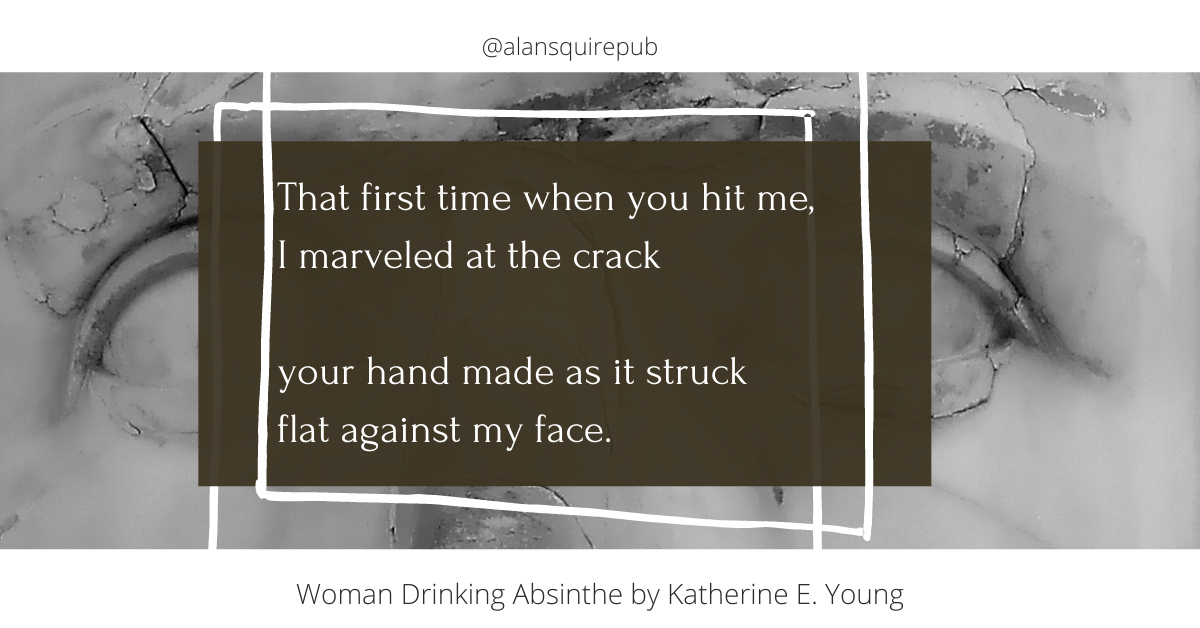WOMAN DRINKING ABSINTHE Analyzed by Billy Mills
Former Guardian Literary Journalist, Billy Mills, analyzes the conception of love in Katherine E. Young's new collection.

"Young’s core subject is love, but there’s nothing redemptive or particularly healing about its manifestations," writes Billy Mills in his analysis of Young's Woman Drinking Absinthe. Elsewhere he compares the different manifestations of this theme to coeval poets Christopher Jane Corkery and James Roome.
Mills analysis is fitting for Young's work which comes from a deeply literary place and is steeped in evocative allusion. Mills places WDA alongside the likes of Pound and Eliot in his thinking. Like these poets, Young uses unorthodox and historically informed forms and diction in her poetry.
An excerpt of Mills' analysis follows:
"The fourth (of five) sections of Katherine E. Young’s Woman Drinking Absinthe is a single sequence, ‘Place of Peace’ that takes off from a visit to the Civil War memorial at Shiloh National Military Park. The fourth section of the sequence opens with he line ‘Who doesn’t desire to be mesmerized by love?’ and ends ‘once more I fear the shadow of his hand.’ These lines could be said to serve as the twin poles of the entire collection.
For Young’s core subject is love, but there’s nothing redemptive or particularly healing about its manifestations."
The poems in Katherine E. Young’s Woman Drinking Absinthe concern themselves with transgressions. Lust, betrayal, guilt, redemption: Young employs fairy tales, opera, Impressionism, Japonisme, Euclidean geometry, Greek tragedy, wine, figs, and a little black magic to weave a tapestry that’s as old as the hills and as fresh as today’s headlines.
Featured Audio: “Letter from Sligo Creek” a poem by Rose Solari
Like the cover photo, the poems in Difficult Weather are timeless and—unlike the poems in many first books—extraordinarily mature. Although the narrative voice is generally that of a young woman in her late twenties and early thirties whose subject matter sometimes ranges back to early childhood, these are poems of adulthood: the discovery and endlessly painful rediscovery of human frailty, sexual and emotional betrayal, bad love in all its familial and romantic varieties, memory, and elegy…
Listen to Grace Cavalieri Interview fmr. Poet Laureate Robert Pinsky
Grace Cavalieri is known widely for her stirring and empathic poetry, collected in her Legacy work Other Voices, Other Lives, but did you know that she is also an impressive interviewer? On her NPR show, The Poet and The Poem, she interviews significant poets from the US and around the world, with an aim of interpreting their lives through their poetry. In her tenure on the program, she has interviewed 9 US Poets Laureate (you can find a list with these archived interviews HERE), including the incomparable Robert Pinsky.
Featured Poetry: “Toytown” by Grace Cavalieri
The name Other Voices, Other Lives, is not purely poetical, in fact, for Grace Cavalieri it is a mission statement. In her Legacy Book of the same name there are several sections in 3rd person omnipotent which aim to breathe the same air as famous women who have suffered adversity. Tragic figure Anna Nicole Smith, feminist writer Mary Wollstonecraft, Cora from William Carlos William’s Kora in Hell. All in all they are an admix of Grace Cavalieri’s poetic life, all brought together in one beautiful volume; so, perhaps, we might figure that Anna Nicole Smith converses with Mary Wollstonecraft for the very first time in the pages of Other Voices, Other Lives.
Today, from the Anna section we have the heart-rending “Toytown”
